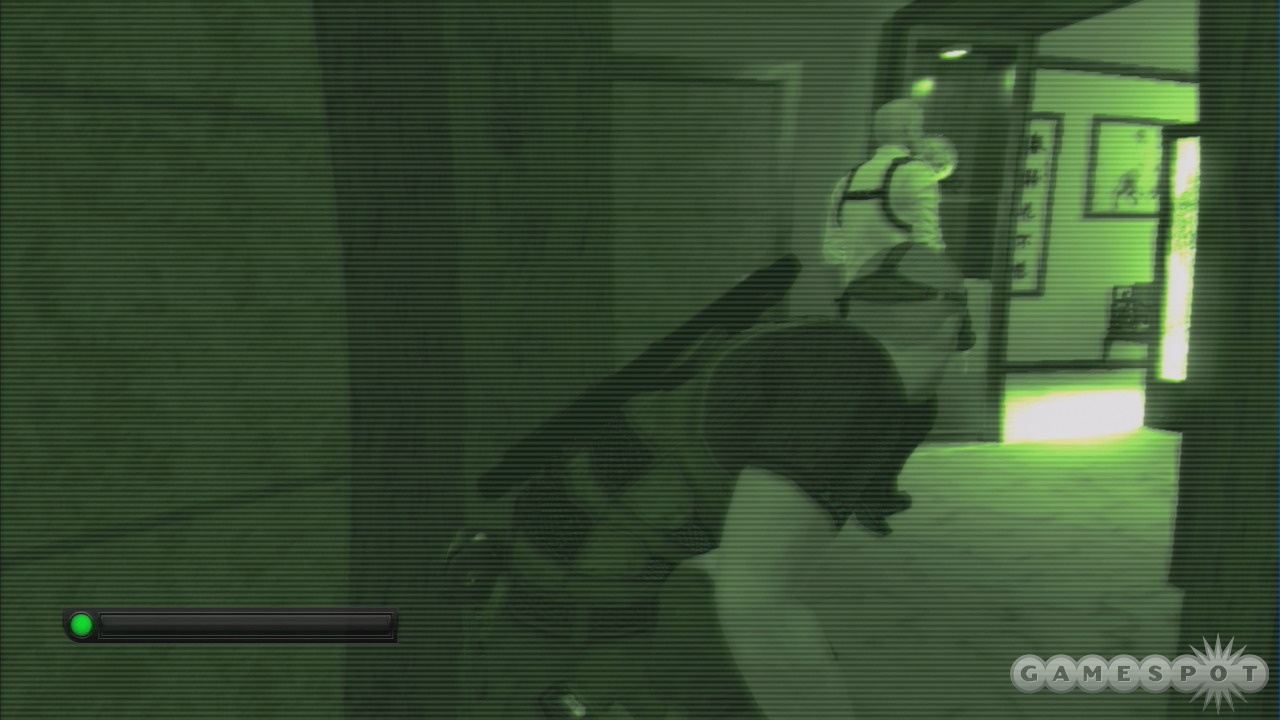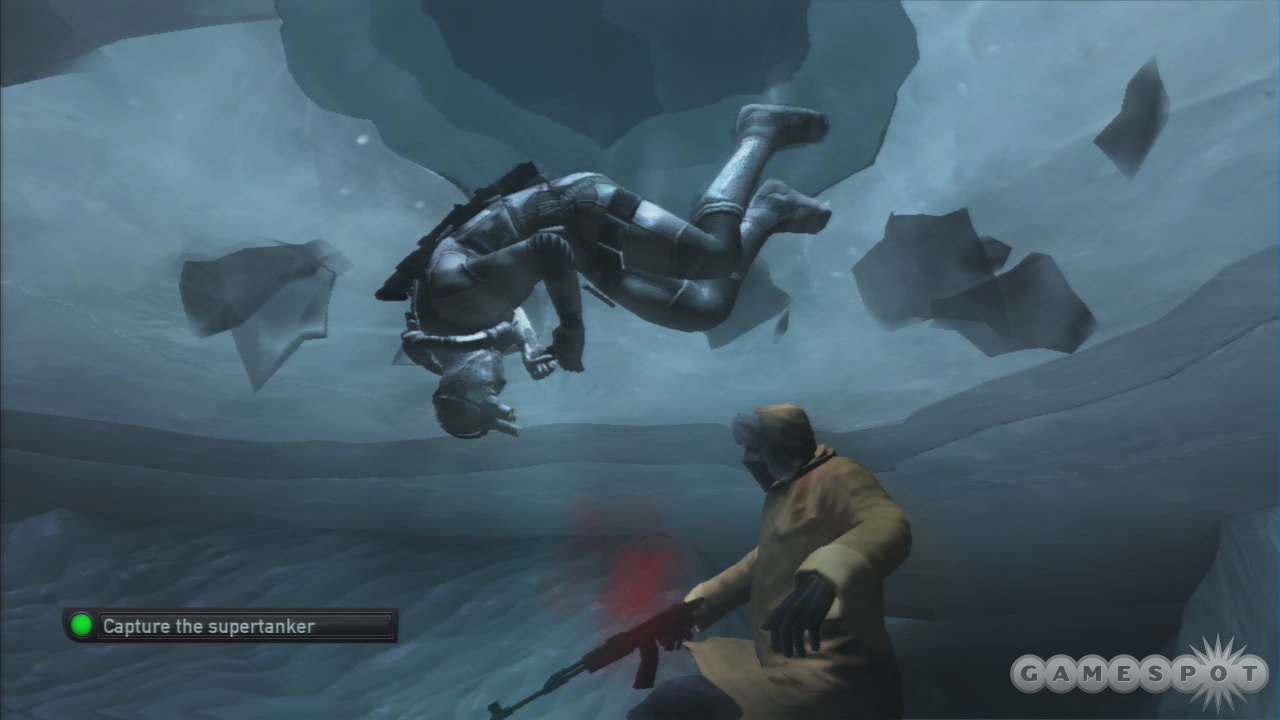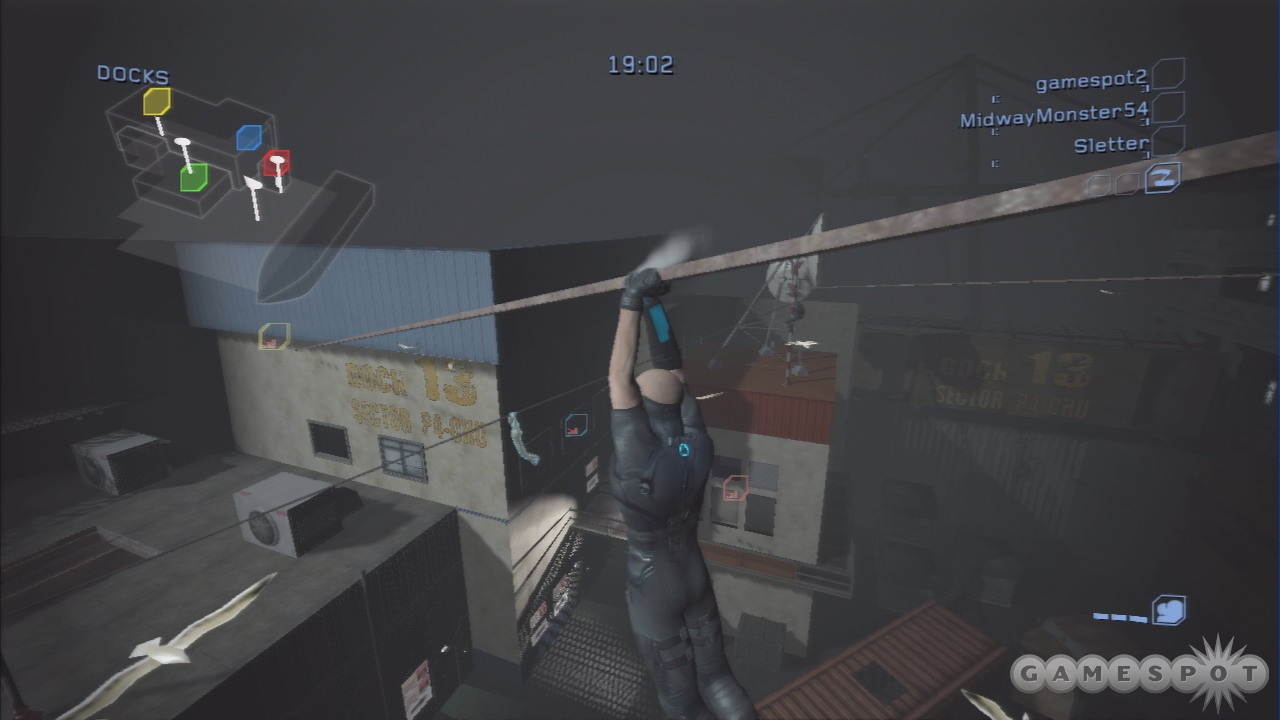It's not easy to be Sam Fisher, the National Security Agency's elite secret agent. Sure, he gets to jet around the world to fabulous destinations, but most of his time is spent skulking in the shadows, waiting for a guard to pass close enough so he can snap his neck, or crawling through ventilation shafts to infiltrate one top-secret facility or another. Of course, Sam's hardships are a gamer's treat because Tom Clancy's Splinter Cell is a series that delivers excellent stealth action gameplay where you get to play as Fisher while he tries to save the free world again and again. With Splinter Cell: Double Agent, Sam arrives on the PlayStation 3 for the first time, and as you'd expect, this is a fine-looking game, though it's a paler imitation of the Xbox 360 version. Still, when it comes to delivering high-tech espionage and tense gameplay, it's definitely worth checking out.

The fourth chapter in the Splinter Cell series gets its name from the fact that Sam Fisher has to serve two masters this time around. There's the NSA, his nominal employer, and a rogue militant group called John Brown's Army, which he has to infiltrate by posing as a recruit. This is a task made easier as Sam links up with the JBA while serving in prison for crimes that he most certainly did commit. But as intriguing as this premise is, it quickly becomes an afterthought because he'll soon be sent around the world to capture a supertanker trapped in the arctic ice, rappel down the side of a Shanghai skyscraper, and sweat under a hot African sun in the midst of a war-torn city in pursuit of your many objectives. Again, Sam must make like a modern, high-tech ninja armed with an incredible arsenal of moves--such as dangling upside down on a line and plucking a passing guard by the neck--and with the latest weapons and equipment.
If you've played any of the Splinter Cell games prior to Double Agent, you'll quickly find yourself at home with the new game because the basic moves and strategies remain the same. Where Ubisoft changes things up a bit is in the way the story unfolds; Sam often has two competing priorities demanding his attention. There are the tasks that the JBA wants him to do, while he also has to keep the NSA happy. This is indicated by a trust meter at the bottom of the screen. If Sam fails an objective for one group, the respective trust meter falls accordingly. Often it's possible to keep both groups happy. For instance, in one mission, Sam has to knock out a radio antenna for the JBA, but before you do so, you can use it to transmit a message to the NSA. On rarer occasions, the game tries to present a moral conundrum by giving you competing objectives. An example of this is when you're told by the JBA to execute a civilian prisoner. Doing so would put you in the JBA's good graces, but it would also make you a bit unpopular with the NSA. Still, it's easy to make up with one side or another by accomplishing many of the secondary objectives in the game.

You score higher if you can get through a level without ever being detected or raising an alarm, though much of the time, you can play aggressively and take out guards somewhat brazenly. And in a game like Double Agent, it's hard to resist the aggressive route because being able to sneak around in the darkness and whack people like an assassin is so much fun. You can whip out the silenced pistol or advanced rifle that Sam carries, snap necks, use the knife in creative ways, and more. One of the coolest kill moves involves swimming underneath arctic ice, coming up below a guard atop the ice, shattering the ice to plunge the guard into the water, and then smoothly stabbing the guard in the heart. It's such an awesome sight that it never gets old.
Getting through the single-player game will take about eight to 10 hours, but the majority of the replay value can be found in Double Agent's impressive multiplayer gameplay, which builds on the spies-versus-mercenaries mode introduced in earlier Splinter Cell games. Basically, a match can pit three players playing as nimble spies against the other three players who are playing as heavily armed mercenaries. The spies have no weapons but are armed with high-tech espionage gear, and their job is to hack into certain computer terminals to steal their secrets. Meanwhile, the mercenaries have to do everything they can to prevent this from happening. What makes the multiplayer in Double Agent better than its predecessors is the focused nature of the map design and the further differentiation of the spies from Sam Fisher.
Like in the single-player game, spies are played from a third-person perspective. However, the spies in multiplayer are a lot faster and nimbler than Sam. They also have their own moves, like being able to jam the mercenaries' weapons. While unarmed, the spies can still take out mercenaries if they can sneak up behind them and get them in a choke hold or can land on their heads. To play as a spy, you've got to think and move fast because stealth is your major advantage over the mercenaries. However, the moment you try to hack into a terminal, the alarms will go off, which means that the mercenaries will come running your way. The mercenaries, on the other hand, are a bit more mobile than before. You play as the mercenaries from a traditional first-person shooter perspective, but now you can rappel down lines and slam spies to the ground with a head-butt or with your rifle. It makes for a tense, fast-paced cat-and-mouse game. Double Agent's multiplayer is further enhanced by a cooperative mode that lets you play with others as spies against mercenaries controlled by artificial intelligence. Additionally, there are rewards for long-term play, which come in the form of unlockable outfits.

Earlier Splinter Cell games in the series tended to look better on the Xbox than the PlayStation 2 since the series was built around the more powerful hardware of the former. Because current-generation consoles are comparable in power, it's not surprising that the PS3 version of Double Agent looks almost as good as the Xbox 360 version, though there are some issues. For instance, the PS3 version lacks some of the complex lighting and shadowing effects that were put to great use in the Xbox 360 version, immersing you in the gloom. Meanwhile, night vision lacks the warm, glowing amplification of lights seen in the Xbox 360 version, and the PS3 version doesn't have some of the 360 version's particle effects, such as smoke plumes. Both versions also suffer from long loading times, as well as a struggling frame rate at times (which struggles a bit harder on the PS3). The good news is that both versions still feature the unmistakable voice of Michael Ironside as Fisher and the voice of Dennis Haysbert as Fisher's NSA boss, Irving Lambert. As you've come to expect from the series, the voice acting is solid, as is the music, which amplifies when things get hairy and retreats once the coast is clear.
Though it's not quite as sharp as the Xbox 360 version, the PS3 version of Double Agent is still a great game. Ubisoft has managed to craft a well-rounded package that features the series' signature stealth action gameplay, along with a rich and enjoyable multiplayer suite and some impressive visuals. And while Sam likes to grumble a lot in the game about how he's getting too old for all of this, Double Agent proves that there's plenty of life left in the franchise.